CAPABILITES
CAPABILITES
TAG takes great pride in our comprehensive in-house manufacturing capabilities, with 95% of our products being manufactured internally. From metal machining and injection molding, braiding, and assembly, to clean room and packing operations, we maintain precise control over the entire production process. Additionally, our specialized Baby TAG department plays a crucial role in producing prototype components for product development.
This comprehensive approach allows us to uphold the highest standards in the medical industry, ensuring the utmost precision, quality, and efficiency in every step of the manufacturing process. By maintaining full control over production, we can deliver innovative solutions that meet the specific needs of our clientele.
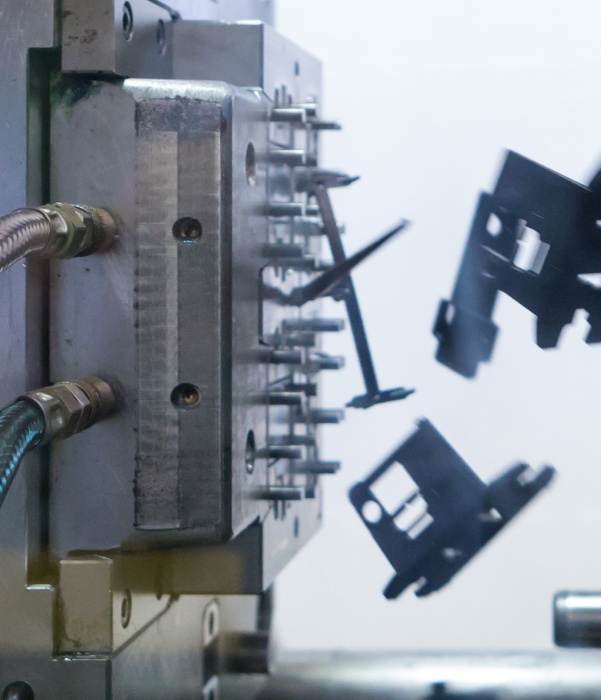
Injection Molding
TAG's Injection Molding division offers comprehensive and cost-effective solutions for precision injection molding, as well as the manufacturing and assembly of silicone, rubber, and metal components for the medical industry.
Our state-of-the-art facility is fully equipped with leading-edge injection machines ranging from 35 to 150 tons, ensuring efficient and accurate production. With advanced processes and electrical machining capabilities, we have the capacity for serial production of large volumes while maintaining high accuracy control.
In addition to traditional injection molding, TAG's capabilities extend to microinjection of thermoplastic materials, automatic unloading performed by robots, silicon multi-shot or multi-material applications, and over-molding.
Materials
Our team has extensive experience in injection engineering and specialized expertise in a wide range of raw materials. These include ABS, polystyrene, nylon, polycarbonates, PEEK, acrylic (with and without fiberglass), polyethylene, rubber, silicone, and metal. Customers can fully rely on our experts who possess the highest level of knowledge and understanding of how best to utilize plastic materials and a variety of other types of raw materials.
Mold Development
TAG’s Injection molds are uniquely designed and built to ensure the production of reliable and accurate parts for continuous manufacturing. TAG conducts routine IQ, OQ, and PQ evaluations to comply with medical qualification protocols.
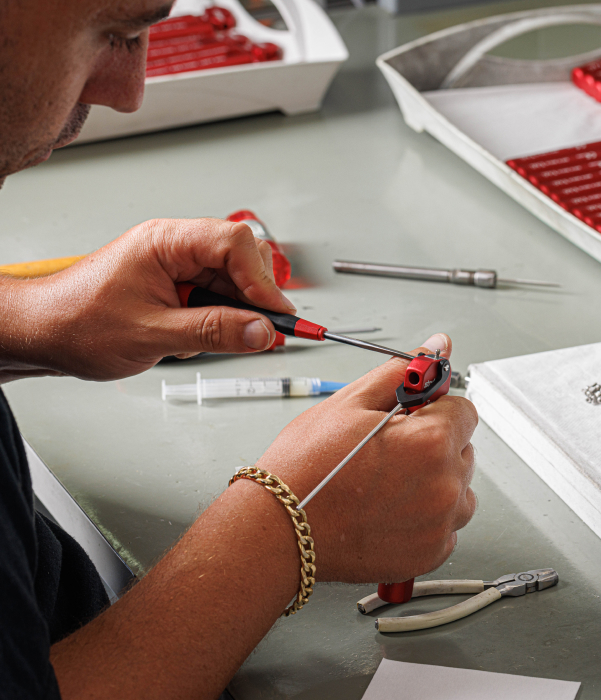
Assembly
At TAG, we take great pride in the exacting assembly process of our instruments. Each assembly procedure is meticulously executed in our facility, with a focus on detail that ensures impeccable quality and perfect alignment, akin to the precision of watchmaking. This concept of watchmaking serves as a crucial criterion for our tools, where assembly accuracy is measured meticulously and supported by state-of-the-art technology.
Instruments
We offer a diverse range of handheld instruments crafted from various materials, guaranteeing reliability and durability. Our range includes graspers, scissors, suture cutters, punches, and more.
Our reusable instruments are manufactured from different types of metals – according to the application, to ensure strength, stability, and resistance to corrosion. In addition, some of our disposable instruments are made from advanced plastics, including various types of polymers, offering flexibility and lightweight characteristics.
Beyond handheld instruments
In addition to handheld instruments, our specialization extends to the production of drills, flexible drills, various screwdrivers, and flexible screwdrivers. This further demonstrates our commitment to precision and quality in instrument manufacturing.
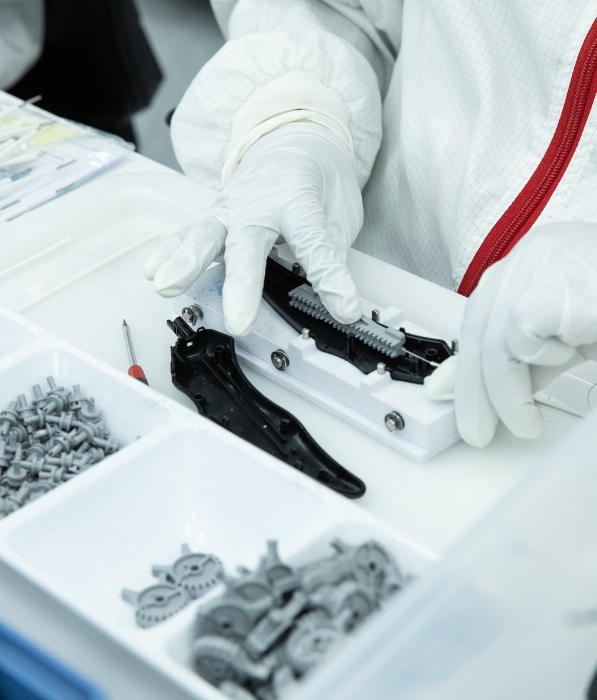
Clean Room & Packing
TAG's spacious clean room adheres to ISO Class 8 specifications, featuring a dedicated closed section that meets the more rigorous ISO Class 7 requirements. The clean room is strategically designed to support the entire sterile assembly and packaging process, starting from the reception of parts to the assembly of the final product, encompassing cleaning, sterilization, and packaging.
Each product is inspected according to its work instructions to ensure final assembly and packaging integrity, and to verify that no errors have occurred during the procedures. Additionally, the clean room accommodates the assembly and packaging of absorbable implants, subjecting them to the same stringent quality control measures.
Sterile Packaging
Our packaging capabilities provide the ultimate solution for fully compliant vacuum pouches and blister sealing.
Final single-use products are packaged and undergo Gamma irradiation or EtO (ethylene oxide) gas sterilization – according to product characteristics and packaging type - to achieve SAL 10-6, the minimum sterility assurance level requirement for medical devices.
Extended Shelf Life
The sterilization process guarantees a product shelf life of up to five years, contingent on external environmental conditions.
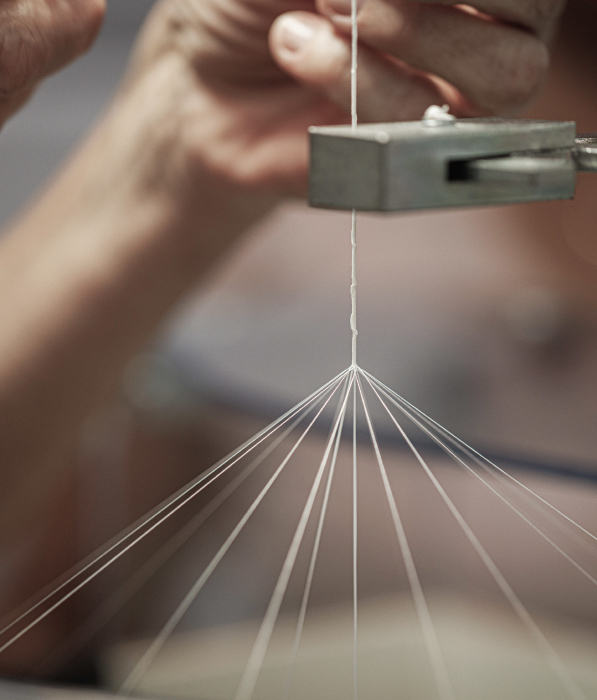
Braiding
Braiding is a technology used to produce round braids like cords or ropes, as well as, flat braids, such as strands. Our professional braiding machines harness this technology to manufacture braided implants, including multi-wire braided structures. The production of braided medical devices demands exceptional precision.
How it works
Due to high production speeds, classic circular braiding machines provide ideal conditions for the production of cylindrical braids. Bobbin carriers are propelled by the rotational movements of individual horn gears on a fixed track continuously transitioning to the adjacent impeller. The typical braid structure is formed as the wires of two counter-rotating bobbin series regularly intersect and are then positioned onto the braid core as the process progresses.
Materials
The preferred starting material for braided implants is polymer fibers, with polyethylene terephthalate (PET) being the most widely used material today. This material gained prominence through the pioneering work of renowned cardiac surgeon Michael DeBakey, who introduced it for this application in 1958. PET has proven to be highly compatible with blood and biocompatible and continues to be utilized to this day.
TAG has the capability, knowledge, and technology to integrate complex suture structures using various raw materials, including nitinol.
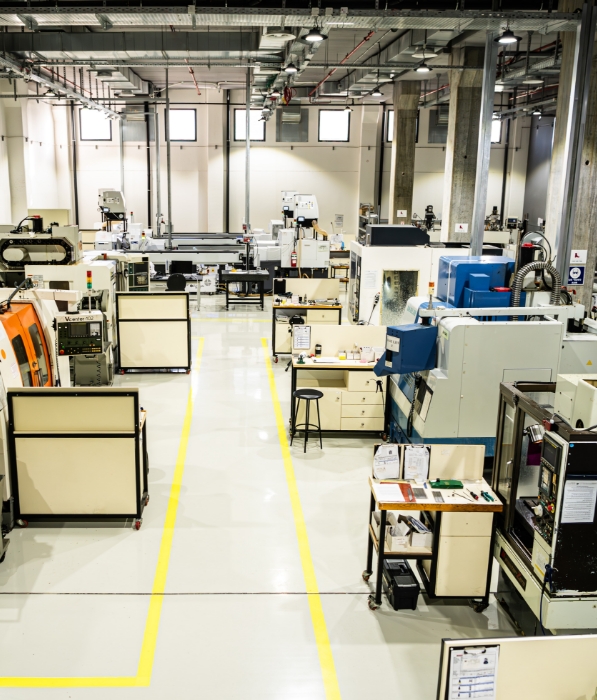
Baby TAG
TAG proactively encourages and facilitates new product development. To achieve this, we established Baby TAG, a unique prototype development division dedicated to new products. Once a viable concept is formed, it is brought to Baby TAG for prototype production. Baby TAG is equipped with a wide variety of machines for prototype manufacturing, including a 3D printing machine and manual and automatic CNC machines.
- CNC: Milling, Swiss-Type Turning, Gun Drilling, Wire/Sinking EDM, Grinding, Surface Treatment
- Laser: Welding, Cutting, Marking
- 3D Printing: Metal, Plastic










